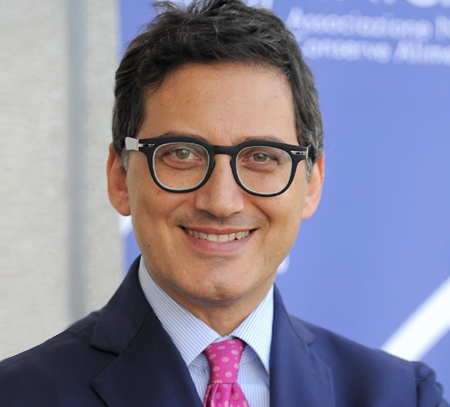January 5, 2022
Kira Nash chatted with Giovanni De Angelis about ANICAV’s work and mission and got his overview of the canning market as it stands.


L’ANICAV — the National Association of Canned Vegetable Industries — was founded in Naples on the 5th of February 1945 by a group of canning industrialists in order to protect the interests of the industry.
From its establishment until today, the Association has always maintained and supported a strategy and initiatives to promote the internationalization of the canning industry. This strengthens institutional relations abroad, promotes strong representation and contributes to the presence of “Made in Italy” in world markets.
In recent years, the Association has changed the scope of its actions and it now combines advocacy with the typical lobbying activity of an industry association. This allows ANICAV to raise awareness and make consumers better informed about the industry.
ANICAV represents companies that process tomatoes, legumes, and citrus fruits. As far as tomatoes are concerned, ANICAV is the largest canning industry association in the world in terms of the number of member companies and the quantity of processed tomatoes.
Our member companies represent 75% of the global tomato processing companies (with a total annual turnover of 2.9 billion euros) and 75% of the global pulse processing companies (with a total annual turnover of 0.6 billion euros). Our member companies process about 70% of all tomatoes processed in Italy and more than 50% of Italian canned pulses.
With regard to canned tomatoes, the raw material is entirely Italian, because the packaging methods of these products require processing times – maximum 24-36 hours from harvest — that are incompatible with the time needed to import the tomatoes from other countries.
On the other hand, it is different for pulses. These come mostly from Canada, the USA, and China, with the exception of some typical varieties from Italy such as chickpeas and lentils, albeit in limited quantities.
What differentiates “Made in Italy” products, whether they are tomatoes or pulses, is their high quality. This is the result of our production methods, the careful selection of the raw materials and, of course, our advanced technology, research, and innovation, which are always associated with a high degree of safety.
The Italian canning industry is known for its high quality, safety, and tradition, and these are based on respect for the land, commitment, and passion. Its products are particularly coveted in foreign markets. The industry has a strong commitment to ensuring safe, responsible working conditions and environmental sustainability, with major investments in energy efficiency and the reduction of water consumption.
The industry depends on the careful selection of raw materials and their careful harvesting to ensure that the products retain all their properties after the transformation process. The origin of the raw materials depends on climatic and meteorological conditions, the morphological conformations of the area, the specific characteristics of the land where the plants are grown, and the productive capacity of the land itself.
In 2021, the export turnover of the entire pulse production sector was 550 million euros of which over 65% was generated by ANICAV member companies. International demand for the canned vegetable sector is strong; over half of our production is destined for the export market, especially to the United Kingdom and Germany. In particular, peas are very popular, not only in the UK — the first target market — but also in West African countries. And beans, apart from being in demand in Europe, are also in great demand in Australia and the United Arab Emirates.
The world demand for canned pulses is in continuous and constant growth, confirming the fact that consumers choose quality products and pay increasing attention to a healthy diet. Pulses, as we know, are rich in vegetable proteins and micronutrients; this makes them a healthy and delicious alternative to proteins of animal origin. And what’s more, they have a guarantee of safety and the same characteristics as fresh products.
Most of the ANICAV member companies are small and medium enterprises typical of the Italian manufacturing sector, but there are also large enterprises and industrial groups.
There are many challenges that await us, increasingly complex global problems that we will be called to face knowing that there are no easy answers. One of these will be to consolidate the pandemic demand and maintain the recovered margins even in "normal" times and be able to redistribute them throughout the supply chain.
At ANICAV, we support our members in their entrepreneurial activities by defending the interests of the canning sector, promoting the development of an economy that translates into growth opportunities for the entire community. The life and activities of our member companies are guided by association, legality, transparency, a business culture, and respect for the environment and workers’ rights. These represent our essential values.
During the lockdown, canned vegetables performed well. Consumers preferred products with a long shelf life, and this had a positive effect on consumption. The internal demand for canned products has reached more than satisfactory levels after years dominated by a fall in demand. This growth has offset the drop in demand in the HORECA channel due to the fact that we could not eat out.
However, the increased costs resulting from the pandemic were notable in primary and secondary packaging, freight costs, and energy. These increases have created considerable problems for our companies, but these problems have been dealt with thanks to significant efforts made by those companies, who have had to take higher prices on-board.
We will certainly continue to focus on the promotion and enhancement of our products both in the domestic market and in EU and non-EU countries. In our opinion, another objective is to work on strengthening the reputation of the sector by focusing on providing the right information. We hope to inform consumers and raise the awareness of those who are willing to pay a premium price, one that takes on board not only the great quality of our products but also the efforts made by the supply chain in terms of ethical, social, and environmental sustainability. This is in addition to the great attention paid by the agri-food industry, and the canning industry in particular, to food safety and the protection of products. And, thanks to the transformation process, it is this protection of products that keeps all the characteristics of the fresh product unaltered.

Canning / packaging / Giovanni De Angelis / Italy / ANICAV / UK / Germany / USA / Canada / Europe / Australia / UAE / HORECA / Covid
Disclaimer: The opinions or views expressed in this publication are those of the authors or quoted persons. They do not purport to reflect the opinions or views of the Global Pulse Confederation or its members.